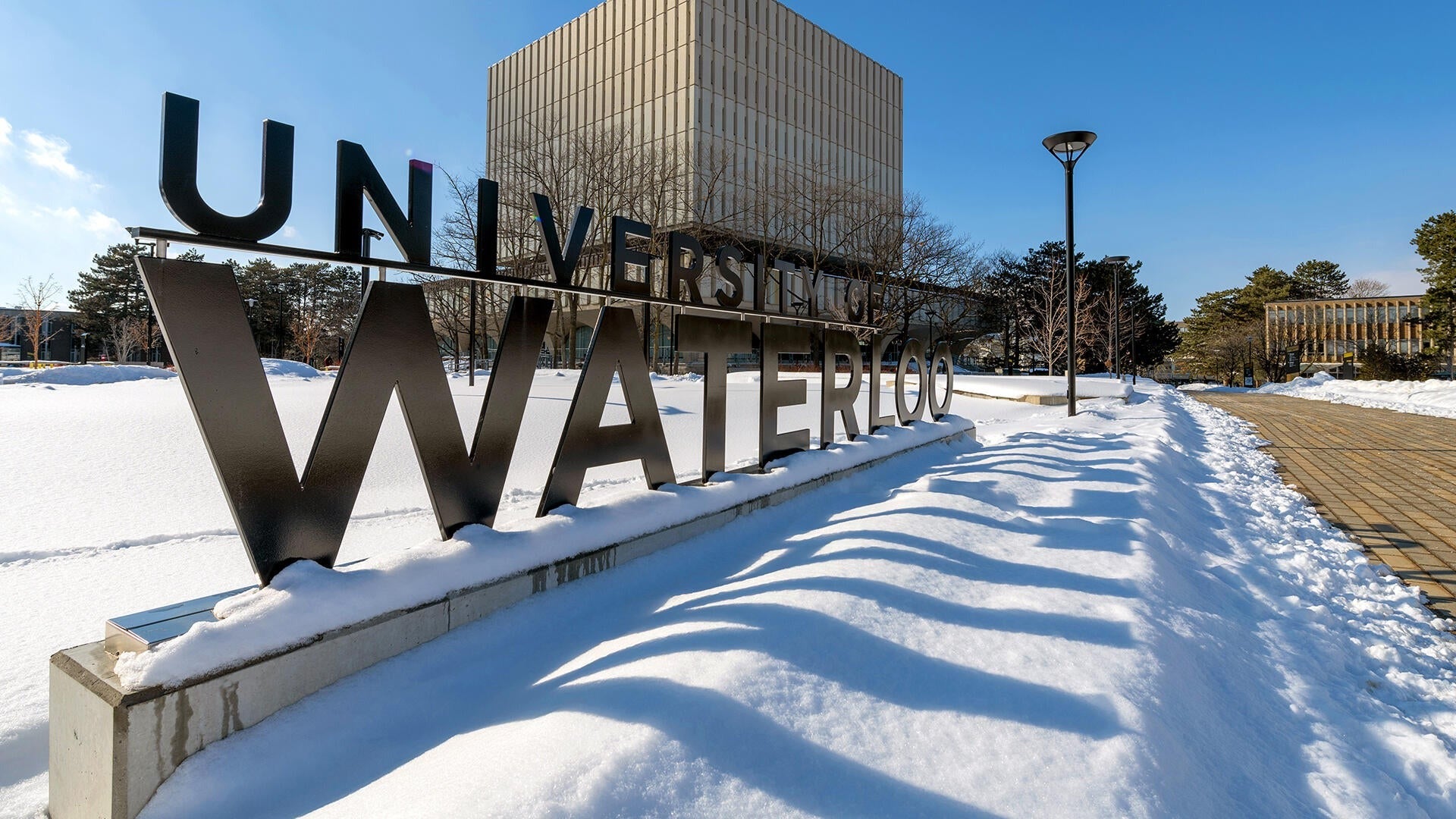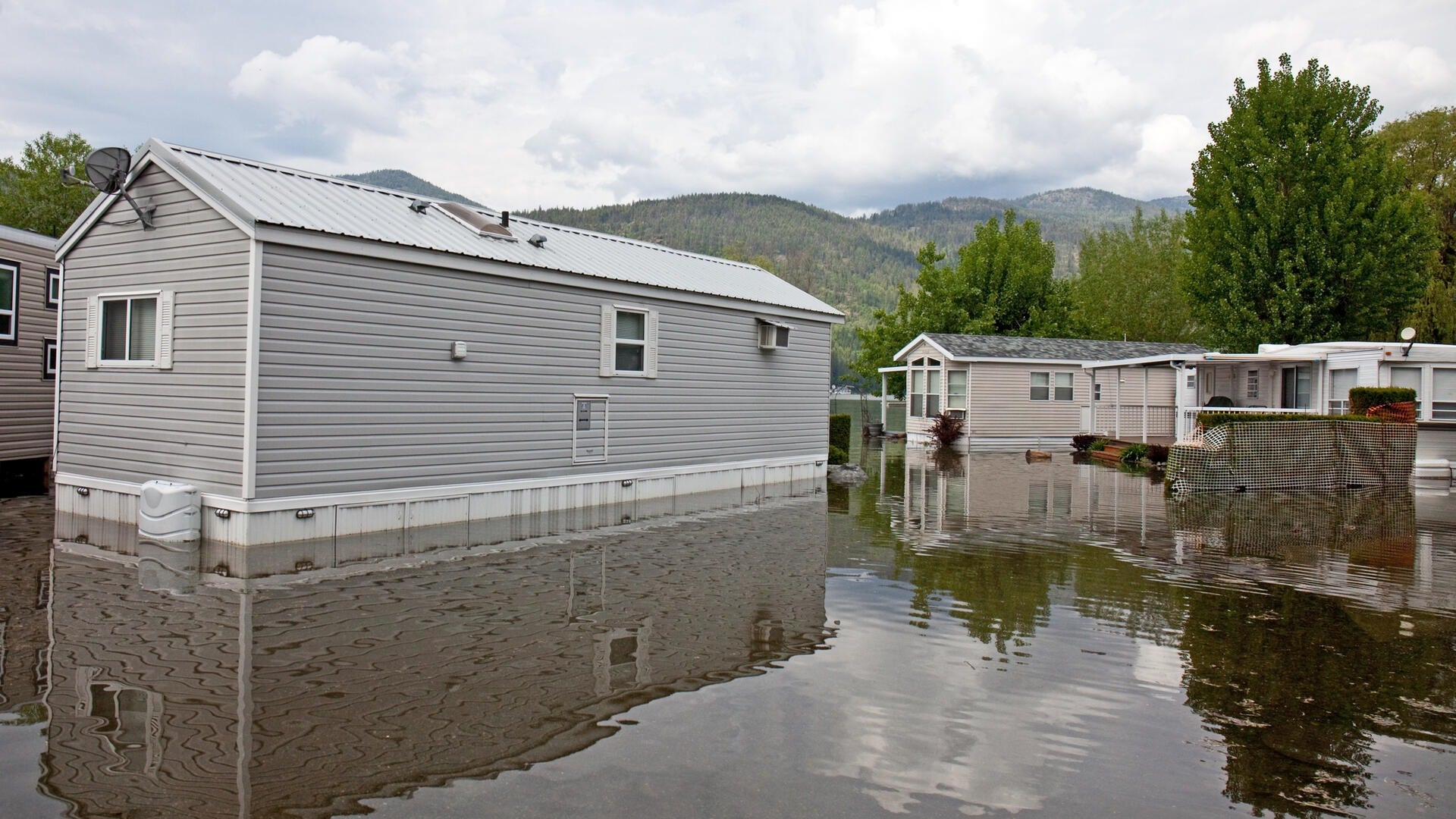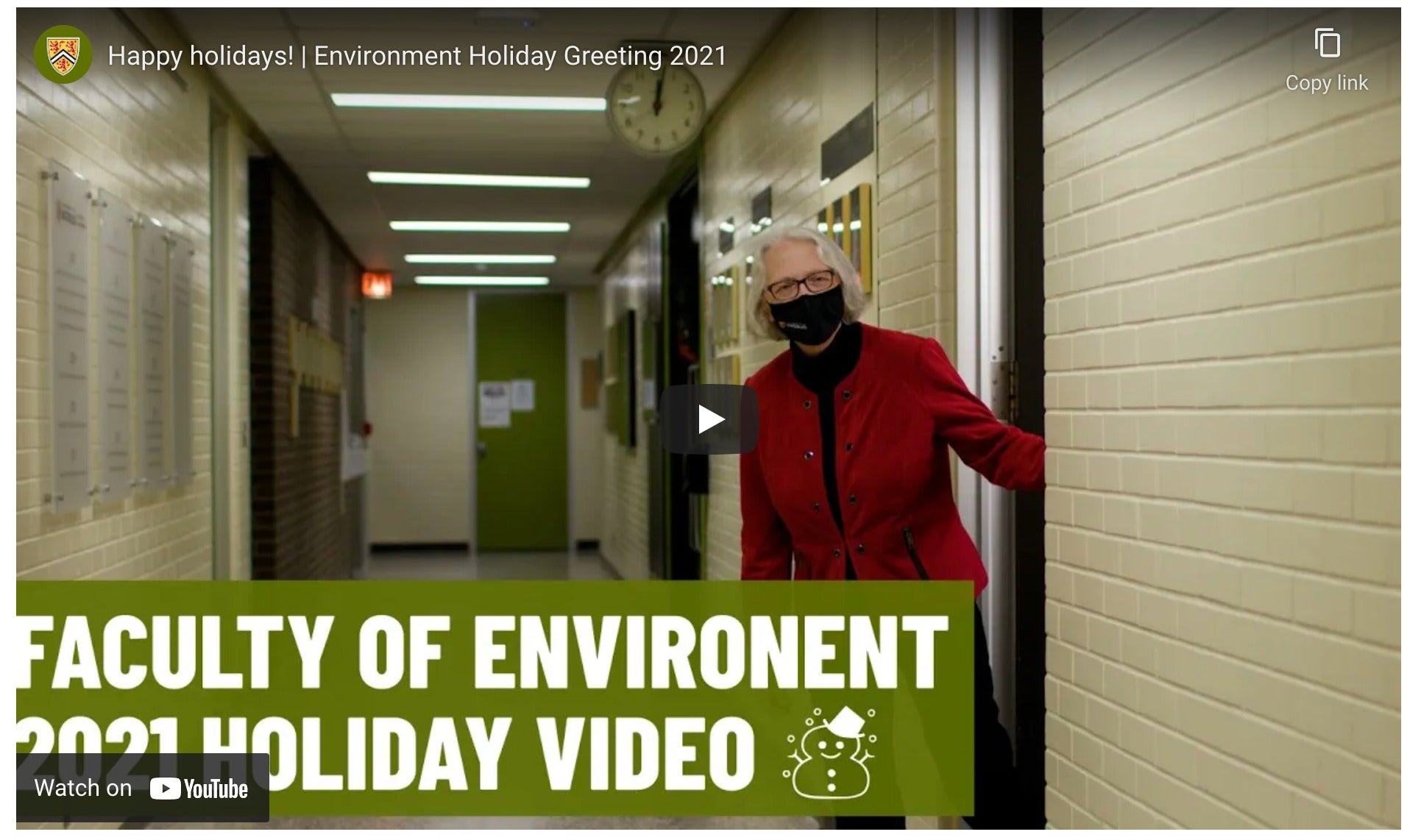Editor:
Brandon Sweet
University Communications
bulletin@uwaterloo.ca
Welcome Back Waterloo guide updated for winter term

In September, we announced our plans for the Winter term, which include a return to pre-pandemic levels of instruction. In addition, we are preparing for more in-person experiences.
If you have questions about what that means for you, you’re not alone.
The Welcome Back Waterloo guide contains information for employees and students about what to expect in the Winter term. Employees can find guidance on meeting protocols, Health and Safety procedures, parking, travel, and mental health supports. Students can use the guide to find out more about campus life, current guidelines, and resources to support their transition.
“There will be days you feel excited about in-person learning, working and re-connecting with friends,” says a note from President and Vice-Chancellor Vivek Goel. “There may also be moments of uncertainty. This is normal. We have all experienced a lot of change during the pandemic. It’s important that you know there are many people, resources, and activities to support you. Please also know that hundreds of our employees have been preparing to welcome you to campus.”
“I hope this guide gives you some information and confidence as you plan your return to campus. We want to be a community that shows genuine care and concern for all students, faculty and staff.”
The information in this guide is current as of December 9, 2021. We will remain nimble as we adapt to government and public health guidance, and any changes to these plans will be communicated by email.
Protect or retreat: rising seas threaten Canada's Atlantic and Pacific Coasts

This article was originally published on Waterloo News.
As witnessed in recent weeks, rising seas, swollen atmospheric rivers and post-tropical storms are a threat to community infrastructure, housing and the safety of those living along Canada’s east and west coasts. In response, new guidance from the Intact Centre on Climate Adaptation, University of Waterloo, presents practical solutions to limit the financial and social costs of these evolving risks.
The majority of Canada’s coastal population lives directly on the Atlantic (east) and Pacific (west) coastlines, where rising sea levels, storm surges, and high tides can act together to cause flooding, with damaging impacts on communities and infrastructure. The need to rapidly combat these threats is underscored in the Intergovernmental Panel on Climate Change’s Sixth Assessment Report, which highlights that sea-level rise is locked-in “for centuries to millennia to come.”
The new guidance, supported by the Standards Council of Canada, the National Research Council of Canada, and Infrastructure Canada, catalogues approaches falling under two types of coastal protection:
- Traditional Grey Infrastructure: Hard, engineered coastal protection measures, such as seawalls, dikes, and barriers; and
- Nature-Based Solutions: Measures that depend on, or mimic, natural systems to manage flood and erosion risk, such as saltmarsh restoration or replenishing beach and dune systems with sand.
Nature-based solutions in particular have a vital role in managing coastal flood and erosion risk in Canada. International experience demonstrates that these measures not only provide protection against coastal flooding and erosion, but can also deliver multiple benefits, including improved biodiversity, carbon sequestration and storage, enhanced social wellbeing and tourism.
“We can no longer manage coastal risks by endlessly fighting against natural processes,” said report author, Joanna Eyquem, managing director of Climate-Resilient Infrastructure at the Intact Centre. “There are real win-win opportunities to work with nature in the long-term, with multiple benefits for the community and beyond.”
The report identifies three interventions to scale up the use of nature-based solutions for coastal protection in Canada:
- National standards that help factor the benefits of nature-based solutions into decision-making;
- Performance monitoring to demonstrate where and how nature-based solutions can work best in Canada; and
- Engagement of the private sector to help finance and deliver nature-based solutions, as part of adaptation finance.
The report also stresses that it is not necessary to choose between “green” or “grey” infrastructure solutions. As with climate adaptation and the reduction of greenhouse gases, both approaches can and should be considered and used together.
“As this year’s devastating floods in BC have shown, we are still not doing enough to defend our communities from the extreme impacts of climate change,” said Chantal Guay, CEO of the Standards Council of Canada. “In this new normal, all adaptation solutions—including those that harness the power of nature—need to be on the table. By compiling case studies and best practices of coastal protection across Canada, this report is an important resource for all coastal communities seeking to guard against the effects of climate change. The report also recommends the development of new National Standards, which have a key role to play in mainstreaming the use of nature-based solutions in coastal adaptation.”
The complete report is available online from the Intact Centre and the Standards Council of Canada.
IDPD 2021 keynote recording and follow-up survey available

A message from the Office of the Associate Provost, Human Resources.
Thanks to all who attended the 2021 International Day of Persons with Disabilities keynote event with Chris Downey on Dec 3. We hope that you found the event informative and engaging. As one of the few blind architects currently working in the world, Chris shared his story and journey, discussed the tools he uses to continue designing, gave us a brief sample of how he navigates and explores the world around him, and provided examples on accessible environments that benefit everyone.
If you were unable to attend or simply wish to revisit key moments of the talk, a recording of the eventis available to watch on Microsoft Stream available until Dec 23 (login required).
As well, we would love to hear your thoughts and feedback as an attendee. Please take a few minutes toanswer this quick survey on the event. Your feedback is helpful for planning any future events on the topic of accessibility.
Vaccinating children against COVID-19

By Natalie Quinlan. This article was originally published on Waterloo News.
Within the initial 12 hours of opening, Ontario reported more than 68,000 bookings to vaccinate children against COVID-19.
The wave of interest in the newly approved Pfizer-BioNTech for those aged five to 11 has health experts weighing in on the benefits and rare risks associated with the shot.
“Unvaccinated people are much more likely to get COVID-19, which can cause serious illness and death in any child,” says Kelly Grindrod, a pharmacist and professor with Waterloo’s School of Pharmacy. “In vaccine trials, children who got two doses of the Pfizer COVID-19 vaccine had a 91 per cent lower chance of getting sick with the virus and experiencing long-term health effect afterwards — it also protects children from getting sick with the Delta variant.”
Long COVID — otherwise known as “post COVID-19 condition” — is being used to describe the range of symptoms that persist for weeks or months after a COVID-19 infection. It’s the reality some have faced after contracting the virus with symptoms ranging from cognitive impairment or brain fog, to heart symptoms like chest pain and palpitations. As with adults, vaccinating children can significantly increase one’s protection against contracting the virus and experiencing long COVID symptoms as a result.
“The Pfizer vaccine for children uses a lower dose than what’s given to teens and adults. Smaller vaccine doses for children work well because children have stronger immune responses than adults,” says Dr. Andrea Chittle, a primary care physician and Master of Public Health student at the University of Waterloo. “No new serious side effects were seen in the Pfizer vaccine trials for children. We know these vaccines are safe for people who have allergies to foods, drugs, insect stings or other vaccines.”
According to Dr. Chittle, for every one million Pfizer doses given to people aged 12 and older, only two to eight cases of anaphylaxis occurred — a severe allergic reaction— highlighting the rarity of side effects.
Boosters for adults now available
As parents book their children up for vaccines, adults like Waterloo’s President and Vice-Chancellor Vivek Goel are preparing to receive his third dose, otherwise known as a booster shot.
“It’s important that we remain in this together and do our part,” Goel says. “It’s also encouraging to see so many parents and guardians being proactive in the effort to protect their children against COVID-19. Vaccines are very effective, and boosters add another layer of protection for myself and my community. I encourage everyone to get their booster as they become eligible.”
As of November 6, booster shots are available six months after the second dose for those considered high-risk, aged 70 or older, are health-care workers or essential caregivers in congregate settings, people who received two doses of the AstraZeneca vaccine or one dose of Janssen, and First Nations, Inuit and Metis adults and their non-Indigenous household members.
Ontario residents can continue to book their vaccination and booster appointments through the province’s website.
Faculty of Environment releases 2021 Holiday video

In keeping with tradition, the Faculty of Environment has released its annual holiday video.
"It’s a light-hearted nod to the Zoom call challenges and social distancing measures that have marked another challenging year, and a celebration of the resilience and resolve that have kept our community moving forward towards, what we all hope, is a brighter, more connected 2022," says a statement from the Faculty. "However you celebrate this time of year, we hope it’s full of good friends, family and lots of fond memories."
Beyond the Bulletin Episode 112

The latest episode of the Beyond the Bulletin podcast is now live. Interview guest Valerie Ward is one of two engineering profs creating a system to grow food in space that could also lead to a reduction in plastic pollution and reliance on fossil fuels on Earth. Three alumni appear on Forbes’ list of 30 Under 30. The Welcome Back Waterloo guide has new information to help you prepare for a return to in-person campus activities in January. And exams get underway.
Link of the day
When and Where to get support
Students can visit the Student Success Office online for supports including academic development, international student resources, immigration consulting, leadership development, exchange and study abroad, and opportunities to get involved.
Instructors looking for targeted support for developing online components for blended learning courses, transitioning remote to fully online courses, revising current online courses, and more please visit Agile Development | Centre for Extended Learning | University of Waterloo (uwaterloo.ca).
Instructors can visit the Keep Learning website to get support on adapting their teaching and learning plans for an online environment.
Course templates are available within your course in LEARN to help you build and edit your content and assignment pages quickly.
The following workshops, webinars, and events are offered by the KL team (CTE, CEL, ITMS, LIB):
- Independent Remote Course Design Essentials, self-directed, continuous self-enrollment course in LEARN.
- Independent Blended Course Design (iBlend), self-directed, ongoing
- Copyright Overview for Waterloo Instructors and Staff - self-directed, continuous self-enrollment course in LEARN.
-
Getting Started in LEARN (CTE6656), Friday, December 10, 10:00 a.m. to 12:00 p.m.
-
Getting Started in LEARN (CTE6656), Wednesday, December 15, 1:00 p.m. to 3:00 p.m.
Employees can access resources to help them work remotely, including managing University records and privacy of personal information. Here are some tips for staying healthy while working from home.
Stay informed about COVID cases on campus by consulting the COVID case tracker.
The Writing and Communication Centre has virtual services and programs to help undergrads, grad students, postdocs and faculty members with academic writing.
- Meet with writing advisors in one-to-one appointments to brainstorm, draft, revise, and polish. No time for an appointment? Try email tutoring for undergrads.
- Beat isolation and make writing progress at weekly Virtual Writing Cafés for grad students and faculty or PJ-Friendly Writing Groups for Undergrads.
- Take an online workshop or apply to our popular Dissertation Boot Camp program.
- Faculty can request custom in-class workshops for their courses, or the WCC can facilitate any existing workshops for student groups.
Co-op students can get help finding a job and find supports to successfully work remotely, develop new skills, access wellness and career information, and contact a co-op or career advisor.
The Centre for Career Action (CCA) is offering some in-person services for fall 2021. The Tatham Centre is open with front-desk support, limited in-person appointments and co-op consults. Services are also available virtually. Book an appointment online or Live Chat with our Client Support Team. The CCA is here to help.
If you feel overwhelmed or anxious and need to talk to somebody, please contact the University’s Campus Wellness services, either Health Services or Counselling Services. You can also contact the University's Centre for Mental Health Research and Treatment. Good2Talk is a post-secondary student helpline available to all students.
While the Library continues to focus on digital resources and consultations, our spaces are open for the fall term. Dana Porter Library is open Monday to Friday, 9 a.m. to 5 p.m., and Davis Centre Library is open Monday to Friday, 9 a.m. to 11 p.m., and Saturday and Sunday, 11 a.m. to 5 p.m. for drop-in individual study space, bookable individual study rooms, drop-in access to computers and printers, book pick-up services and IST Help Desk support. Special Collections & Archives and the Geospatial Centre will be accessible by appointment. Library staff are available for questions via Ask us. Full details on current services and hours are available on the Library’s COVID-19 Update webpage.
The Faculty Association of the University of Waterloo (FAUW) continues to advocate for its members. Check out the FAUW blog for more information.
The University of Waterloo Staff Association (UWSA) continues to advocate for its members. Check out the UWSA blog for more information.
The Sexual Violence Prevention and Response Office (SVPRO) supports all members of the University of Waterloo campus community who have experienced, or been impacted, by sexual violence. This includes all students, staff, faculty and visitors on the main campus, the satellite campuses, and at the affiliated and federated Waterloo Institutes and Colleges. For support, email: svpro@uwaterloo.ca or visit the SVPRO website.
The Office of Indigenous Relations is a central hub that provides guidance, support, and resources to all Indigenous and non-Indigenous campus community members and oversees the University's Indigenization strategy.
The Waterloo Indigenous Student Centre, based at St. Paul’s University College, provides support and resources for Indigenous students, and educational outreach programs for the broader community, including lectures, and events.
WUSA supports for students:
Peer support - MATES, Glow Centre, RAISE, Women’s Centre - Visit https://wusa.ca/peersupport to book an appointment either in person or online for the Fall term.
Food Support Service food hampers are currently available from the Turnkey Desk 24/7 in the Student Life Centre. Drop off locations are also open again in SLC, DC, DP, SCH and all residences.
Co-op Connection all available online. Check https://wusa.ca for more details.
Centre for Academic Policy Support - CAPS is here to assist Waterloo undergraduates throughout their experience in navigating academic policy in the instances of filing petitions, grievances and appeals. Please contact them at caps@wusa.ca. More information is available.
WUSA Student Legal Protection Program- Seeking legal counsel can be intimidating, especially if it’s your first time facing a legal issue. The legal assistance helpline provides quick access to legal advice in any area of law, including criminal. Just call 1-833-202-4571.
Empower Me is a confidential mental health and wellness service that connects students with qualified counsellors 24/7. They can be reached at 1-833-628-5589.
GSA-UW supports for graduate students:
The Graduate Student Association (GSA-UW) supports students’ academic and social experience and promotes their well-being.
Advising and Support - The GSA advises graduate students experiencing challenges and can help with navigating university policies & filing a grievance, appeal, or petition.
Mental Health covered by the Health Plan - The GSA Health Plan now has an 80 per cent coverage rate (up to $800/year) for Mental Health Practitioners. Your plan includes coverage for psychologists, registered social workers, psychotherapists, and clinical counsellors.
Dental Care - The GSA Dental Plan covers 60 per cent to 70 per cent of your dental costs and by visiting dental professionals who are members of the Studentcare Networks, you can receive an additional 20 per cent to 30 per cent coverage.
Student Legal Protection Program - Your GSA fees give you access to unlimited legal advice, accessible via a toll-free helpline: +1-833-202-4571. This advice covers topics including housing disputes, employment disputes, and disputes with an academic institution.
The Graduate House: Community Space Open M - F @ 11:30 a.m. to 6:00 p.m. - We’re open to all students, faculty, staff, and community members. The Graduate House is run by the GSA-UW. Graduate students get special discounts. We are hiring all positions. Bring your resume to the bar.
BIPOC Student Collective - The Collective is a safe space for BIPOC LGBTQ2+ students and aims to foster intergenerational and peer-to-peer support and mentorship. Join the online Discord channel for solidary chats and drop-in sessions.
When and Where (but mostly when)
Healthy Warriors at Home (Online Fitness).
Warriors vs. Laurier Blood Donation Battle. Join your fellow Warriors, donate blood and help us win the Blood Battle against Laurier for a second year in a row. Set up a profile or add the PFL code: UNIV960995 to your account if you have a blood.ca account already. Questions? Contact WarriorsInfo@uwaterloo.ca.
Drop-in to Warrior Virtual Study Halls on Wednesdays from 5:30 p.m. to 7:00 p.m. Come together in this virtual space to set goals and work independently or in groups each week.
Renison English Language Institute continues to offer virtual events and workshops to help students practice their English language skills.
Fall 2021 examination period, Thursday, December 9 to Thursday, December 23.
Spiritus Ensemble, conducted by Kenneth Hull, Professor Emeritus at Conrad Grebel University College, presents Handel's Christmas Messiah, Sunday, December 12, 3:00 p.m. and 5:00 p.m. Seating is limited - tickets available online at Eventbrite.com or through spiritusensemble.com.
Portfolio & Project Management Community of Practice (PPM CoP) session, "Project and portfolio management tool demo" Wednesday, December 15, 9:00 a.m. to 10:00 a.m. Register for this event.